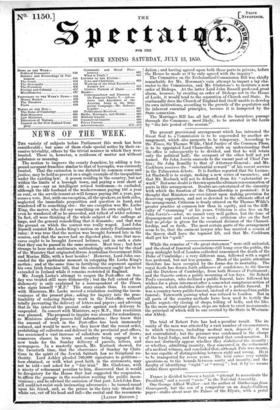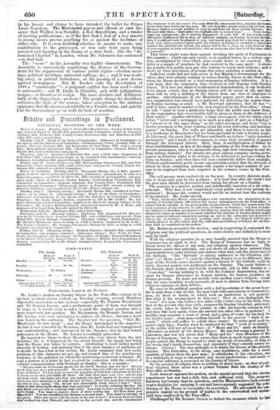France is divided between a boyish "attempt to assassinate the
President," and a recent " scene" in the National Assembly. One George Alfred Walker—not the author of Gatherings from Graveyards, but the son of a compositor on an Anglo-Oahican paper—stalks about near the Palace of the Elysee, with a pistol
in his breast, and claims to have intended the bullet for Prince Louis Napoleon. The Ministerial papers and office-rs at once dis- cover that Walker is a. Socialist, a Red Republican, and a reader of inciting publications ; as if the fact that a fool of a boy resorts to strong meats proves anything for or against the doctrines of either side. It is even doubtfu‘whether he meant to make any contribution to the graveyard, or was only bent upon being arrested and figuring in the drama of a state trial ; like the "de- termined Chartist' m London, whom Mr. Salomons has sentenced —to find bail.
The " scene " in the Assembly was highly characteristic. The Assembly is successively registering the decrees of the Govern- ment for the suppression of various public rights—election meet- ings, political meetings universal suffinge, &c. ; and it was work- ing away, in patient iurbulence, at the passing of a new decree against newspapers. But II. Rouher calls the Revolution of 1848 a "catastrophe" !—a poignant epithet has been used !—that is unbearable ; and M. Ernie de Girardin, pale with indignation, resigns—or threatens to resign. The more resolute and deliberate bulk of the Opposition—protests ! The people shrugs its shoulders, Criticizes the style of the orators, takes exception to the abstract epigrams that fly about so plentifully in a Prench crisis, and quietly lets the Government go on with its task of reaction.



























